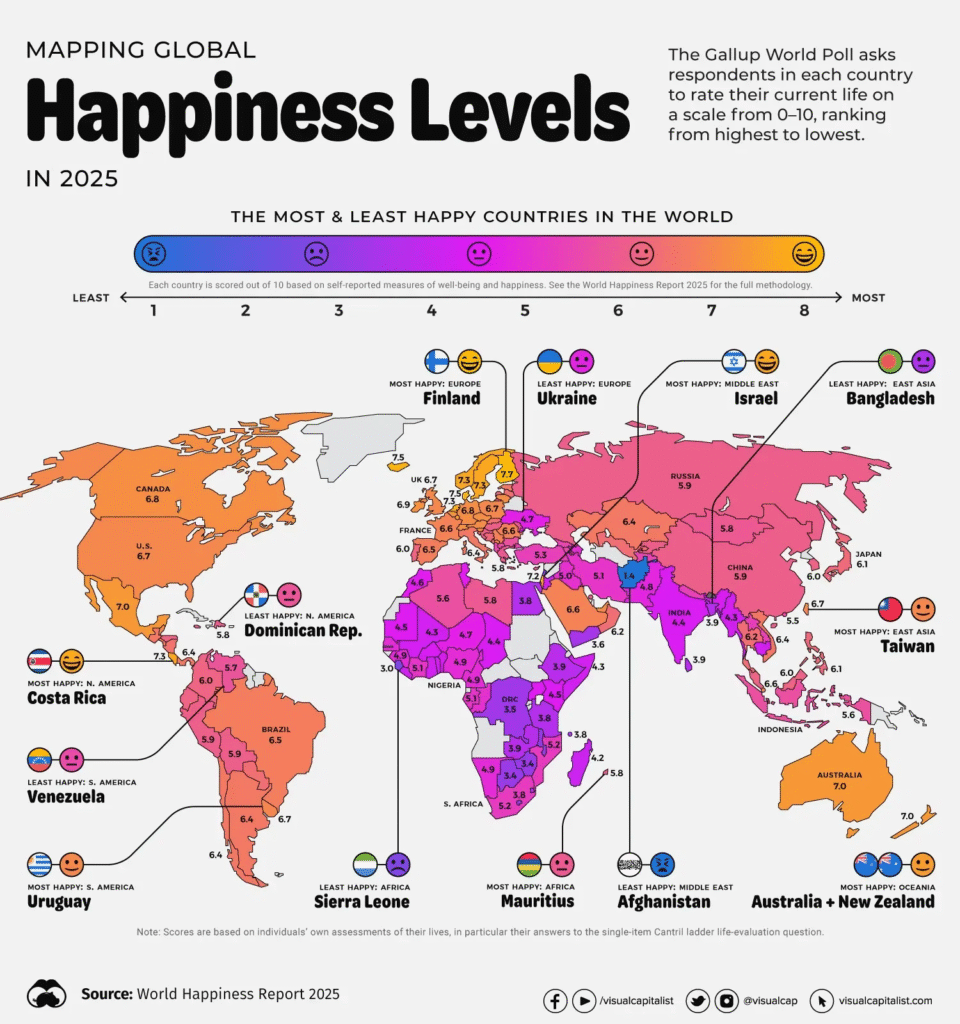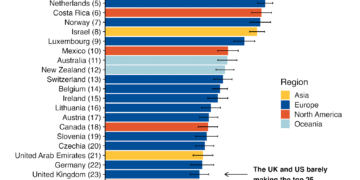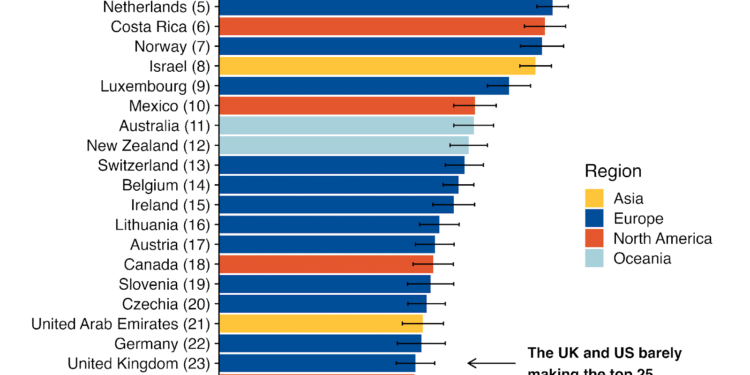Discover where India stands — and how the world’s happiest countries stack up in 2025. The World Happiness Report 2025 ranks 147 nations, with India placing 118th, while Finland tops the list for the eighth straight year
Every year, the World Happiness Report (WHR) draws attention not just for which nations top the list, but for the story it tells about wellbeing, trust, social connection and the evolving concept of “happiness”. The 2025 edition, published on 20 March by the Wellbeing Research Centre at University of Oxford in collaboration with Gallup and the United Nations Sustainable Development Solutions Network (SDSN), encompasses 147 countries and extensive survey data across 2022-24.
Key Metrics & Methodology
The WHR isn’t simply about material wealth: it uses the “Cantril Ladder” question—asking respondents to evaluate their life on a scale from 0 (worst) to 10 (best) — and combines that with six core variables:
- GDP per capita
- Healthy life expectancy
- Social support (“If you were in trouble, do you have someone to count on?”)
- Freedom to make life choices
- Generosity (donations/volunteering)
- Perceptions of corruption
The survey period covers responses from 2022 to 2024 averaged, so the ranking reflects relatively recent life‐evaluation trends.
Top‐Ranked Countries: What Can We Learn?
The Winners
Here are the leading countries in the 2025 list:
- 1. Finland – retains its top position for the eighth consecutive year.
- 2. Denmark
- 3. Iceland
- 4. Sweden
- 5. Netherlands
What Makes Them Happy?
Several recurring factors stand out:
- Social support & trust: In many Nordic countries, high levels of trust (in institutions and among citizens) significantly bolster life‐satisfaction. For example, beliefs like “If I lose my wallet someone will return it” serve as a proxy for social trust.
- Work‐life balance and nature: Countries like Finland emphasise accessible nature, shorter commuting times, generous leaves, all of which contribute to wellbeing.
- Equality and welfare: Universal healthcare, strong public services, and low inequality create a foundation for higher wellbeing.
- Household size and shared meals: Interestingly, the report emphasises social connection—sharing meals, living with 4‐5 people, and having close ties—to be strongly correlated with happiness.
Notable Entries and Trends
- Costa Rica entered the top-10 for the first time (ranked 6th) — signalling that high happiness need not depend solely on high GDP.
- Some large economies like United States (US) have seen declines, attributed to rising social isolation and weakening support networks.
Where Does India Stand — and Why?

India’s Rank at a Glance
- In the 2025 report, India is ranked 118th out of 147 countries.
- This is an improvement from its previous position of 126th in 2024.
- Its reported “life-evaluation” score is around 4.389 out of 10 for the 2022-24 period.
How India Comes Out in the Sub‐Indicators
- Generosity/Volunteering: India ranks relatively high in volunteering – 10th globally in terms of volunteering activities.
- Returning Wallets / Trust: India is 115th when yardsticks relate to ‘wallet returned by a neighbour’, 86th for stranger returning wallet, 93rd for police. These indicate trust/social capital are weaker.
- Meal Sharing: India is 132nd globally in “sharing meals” with others, with about 4 shared meals per week on average. Researchers observe this as a proxy for social connection.
Comparative Context
- India ranks below neighbors like Nepal (92nd) and Pakistan (109th).
- Despite being among the fastest-growing major economies, India’s happiness ranking lags due to gaps in social support, trust, freedom and inequality.
Why Is India Still So Low — Despite Growth?
Structural & Economic Factors
- GDP per capita remains modest relative to many countries above India. While India’s total economy is large, per‐person income and wealth remain constrained.
- Health and life expectancy improvements continue, but large disparities persist across states and social groups.
- Freedom of choice and personal agency: The report emphasises freedom to make life choices as a key metric. While India has made strides, the lived reality for many is still limited.
Social & Cultural Dynamics
- Weak social support networks in urban areas: Rapid urbanisation has led to breakdown of extended family structures and traditional community networks—factors that boost happiness in other countries.
- Trust and corruption perceptions: Lower trust in institutions and neighbours weighs down life evaluations. The wallet-returning proxy underlines this.
- Shared meals, household size: As the report states, sharing meals and larger household sizes correlate with higher happiness. India’s low ranking in meal-sharing suggests this is an area needing cultural and social attention.
- Mental health, youth alienation: Globally, one worrying trend is rising social isolation among young people. While India has comparatively stronger family ties, there is increasing stress around jobs, housing, migration, and mental health concerns.
A Cultural Paradox
India’s rich cultural heritage, strong traditions, and vibrant community life might suggest high life satisfaction — and yet the data suggest otherwise. The disconnect arises because:
- Happiness in this report is self‐evaluated—what matters is how individuals feel about their lives now, not just cultural or spiritual optimism.
- Economic and social modernization brings trade‐offs: urban stress, migration, breakdown of older support systems.
- By global standards, amenities, health care, social security and institutional trust are still catching up.
What Has Improved — And Where Is Progress Being Made?
Positive Trends
- The improvement from 126th to 118th in one year is significant. It indicates that even marginal gains in key areas can shift ranking.
- Higher volunteering indicates strong civic engagement.
- Policy initiatives (healthcare access, digital inclusion, social welfare) are gradually improving foundations.
Persisting Challenges
- Large internal disparities: Across Indian states there is variation in health outcomes, education, infrastructure – which affects perceived wellbeing.
- Urban stress and isolation: As more people migrate to cities, traditional support systems may erode, contributing to loneliness and mental health issues.
- Quality of social support/trust: More than availability of support, the feeling that one can rely on someone is what matters.
- Work‐life balance: Economic ambition and long working hours, especially in metro areas, can reduce time for leisure, rest and family – affecting happiness.
What Can India Learn from the Top Performers?
| Key Factor | What the Top Countries Do | Implication for India |
|---|---|---|
| High trust & social support | Nordic nations have high institutional and social trust. | Strengthen community cohesion, reduce corruption, promote local support networks. |
| Work-life balance + nature access | Fin-Denish systems emphasise rest, nature, social leisure. | Urban planning to incorporate green spaces; encourage shorter commutes, better leave policies. |
| Generosity + volunteering culture | Strong civic engagement adds to life satisfaction. | Expand volunteering programs; recognise and support community service. |
| Freedom to make life choices | Citizens feel empowered to choose their path. | Continue reforms in education, social mobility, reduce bureaucratic hurdles. |
| Household/social meal sharing | Social connection through simple acts like shared meals counts. | Promote community meals, social spaces, cultural gatherings especially in urban zones. |
Why This Ranking Matters for India
- Policy relevance: The ranking highlights where India needs to focus—not just economic growth but human happiness and wellbeing.
- Corporate & organisational implications: For businesses, employee wellbeing, workplace culture, mental health have direct relevance.
- Individual reflection: The report underscores that happiness is more than money – community ties, trust, freedom matter.
- Global image and competitiveness: A better happiness ranking can boost soft power, attractiveness for talent and investment.
Critical Reflections: Limitations & Debates
- Subjectivity: Happiness surveys inherently rely on self‐assessment. Cultural differences could affect how people respond.
- Time‐lag and averaging: The 2025 ranking uses a three-year average, meaning rapid changes may show up slowly.
- Comparative caveats: Nations are very different in culture, economy, population size — direct comparisons require contextual nuance.
- Data gaps: Some countries may have weaker data collection systems; urban/rural divides may skew perceptions.
Looking Ahead: What to Watch
- Will India’s rank continue improving in coming years as policy reforms, digital access, social welfare expand?
- How will the post-pandemic evolution (remote work, urban migration, mental health awareness) affect happiness globally and in India?
- Can India leverage its youthful demographic and cultural strengths (volunteering, community service) to boost social support and trust?
- What state‐level or city‐level initiatives will emerge that boost happiness in practical terms (public spaces, social connectivity, nature access)?
Final Thoughts
The World Happiness Report 2025 shines a light on a vital dimension: how satisfied people feel with their lives, rather than just economic output. For India, ranking 118th is a mixed signal: on one hand a welcome improvement, on the other a reminder of much work ahead.
If India is to make significant progress, the focus must shift from growth of GDP alone to growth of trust, social support, freedom and connection. As the report suggests, sometimes the most powerful drivers of happiness are not expensive — sharing meals, having someone to count on, feeling free to choose a path.
In a rapidly changing India, balancing economic ambition with human wellbeing will be the challenge of the decade. The ranking gives us not just a number, but a mirror: Are we building societies where individuals feel supported, free, and truly able to say they are living a good life?
Would you like a breakdown of how each South Asian country ranks in this 2025 report, or a deep dive into state‐wise happiness in India?
Also Read : Bengaluru man says landlord disappeared without returning security deposit: ‘Unethical and breach of trust’















 Categories
Categories









